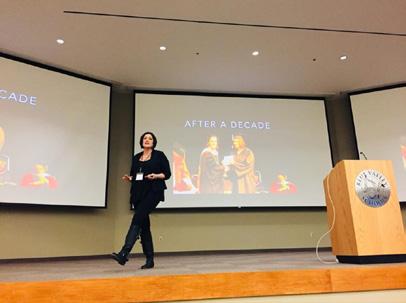
5 minute read
BEATING THE ODDS
An alumna returns to teach campus about recognizing and building resiliance in students.
Rebecca Lewis-Pankratz ‘13 was in and out of crisis situations for many years growing up and as a young adult. When she found her way to McPherson College as a non-traditional student, she experienced professors who saw her talents and not her crises. She found encouragement and built resilience despite her challenges. She recently returned to campus to share her story and introduce faculty and staff to the concept of trauma-responsive practices that promote social and emotional well-being for students.
Lewis-Pankratz is the co-founder of the Resilience Team, a project of the Educational Services and Sta Development Association of Central Kansas (ESS-DACK). She is the organization’s director of resilience and student services.
The story she shared with McPherson College staff began when she moved to McPherson from California as a young girl. Her sense of wonder, freedom, and family were encouraged by supportive elementary school educators. Too young to realize how she differed from her peers, she excelled in school when she first arrived in McPherson. It was in middle school when the differences became more apparent to her.
“That’s when I realized that I was really poor and that poor was not good,” she said. “I didn’t have supportive teachers, and I found strength in fighting and being in trouble.”
She started working at 13 years old. She liked making money more than attending school and earned enough to move out at 15. She didn’t want to stay in school, and at age 16, she quit. It’s worth noting, she says, that there were some high school educators whose influence made a lifelong impact —specifically, her English teacher and art teacher.
“There were a couple of teachers I would walk across town to attend their classes,” she said. “They had a pull on me.”
She left McPherson for a few years and was in an abusive marriage for 13 years but found the courage to leave it at 29 years old and pregnant with her first son. She knew she had to do something different. She worked and enrolled in a community college.
“I started a degree and started dreaming,” she said. “I loved art, and back in high school, Mrs. Liligren told me I was good, so that’s where I started.”
Six years after starting her journey to a degree, she returned to McPherson. With two sons and pregnant with her third, she found her way to McPherson College. It would take her 10 years to attain her degree, and during that time, there were many people she credits for holding her together. From professors in the art department and business office staff to a campus custodian, each played an essential role in her educational journey.
“Some weren’t afraid to have difficult conversations and tell me what I needed to hear,” Lewis-Pankratz said. “People at McPherson College never treated me in accordance with what I was living but with who they saw I was becoming.”
Lewis-Pankratz believes many people on college campuses have the power to shape students and help build their resilience. Her presentation to campus introduced concepts that she knows will support faculty and staff in that important work.
“Walking through adversity with students can be really hard,” she said. “I was in my 30s and had some tools to navigate it in an adult way, but most students are much younger and not equipped yet. Many are running from something to something but don’t know what it is yet.”
Lewis-Pankratz’s research about how trauma impacts brain development started in 2015 while she was working with STEP MC, an organization in McPherson dedicated to ending poverty through building supportive relationships. She began studying, attending conferences, and learning from experts about how trauma can significantly impact our ability to learn, form memories, regulate emotions, and how trauma affects our ability to be calm, think, reflect, and respond flexibly and in planned ways.
“My story articulates the truth of the science,” she said. “I’m proof that safe, supportive adult relationships can help a person build resilience. I wanted the McPherson College staff to know that there are many different types of brains on campus and understand that not all need the same things. Brains shaped by survival take time and intentionality before they can be in planning, problem-solving, and organized ways to experience college.”
Throughout her career, Lewis-Pankratz has started 17 poverty projects in Kansas and Illinois, working with 500 families, helping them get out of financial poverty, and forming community around relationships. She sees the impact of trauma caused by poverty and how it affects student achievement.
Her introduction of trauma-informed practices is the first of several trainings the McPherson College faculty and staff will participate in while working with the ESSDACK Resilience Team.
“I thank God for the many McPherson College staff who sat beside me while I was a student there,” she said. “Without their support and direction, I would not be where I am today. I wanted to remind faculty that how they show up matters, and through connected experiences with their students, they can change a life course. This is how we build resilience.”
ESSDACK was founded in 1983 by educators committed to providing quality educational services to their students. They recognized that not all students’ needs could be met individually and came together to create a positive solution to provide various educational services to school districts. ESSDACK serves the Buhler, McPherson, Sterling, Pretty Prairie, and Nickerson school districts.




